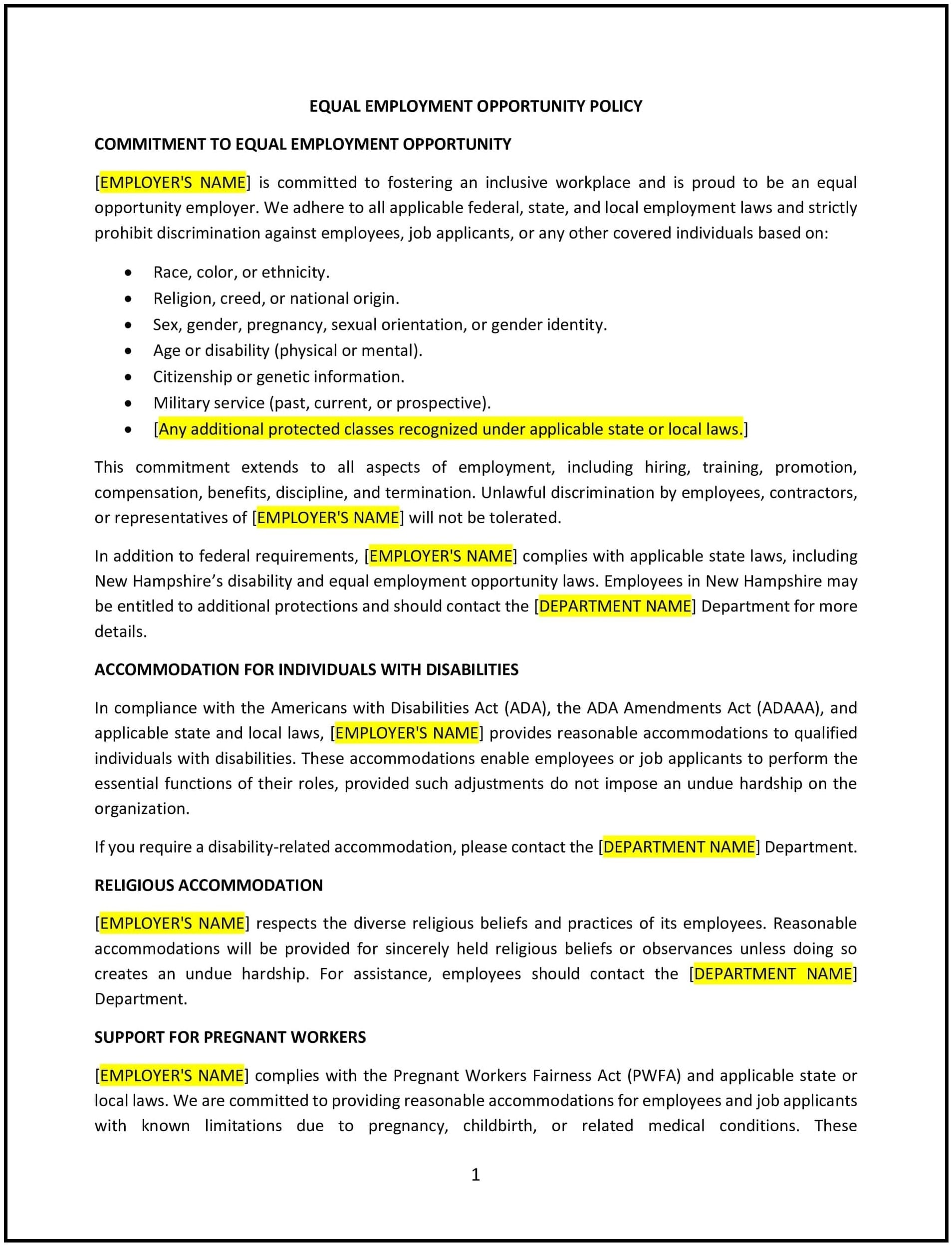Equal employment opportunity plan (New Hampshire): Free template
Got contracts to review? While you're here for policies, let Cobrief make contract review effortless—start your free review now.

Customize this template for free
Equal employment opportunity plan (New Hampshire)
An equal employment opportunity (EEO) plan helps New Hampshire businesses promote fairness, diversity, and inclusivity in hiring and employment practices. This policy outlines the company’s commitment to providing equal opportunities for all employees, regardless of race, color, religion, sex, national origin, disability, or any other characteristic protected by state and federal laws.
By adopting this plan, businesses in New Hampshire can foster a diverse workforce, ensure compliance with anti-discrimination laws, and create an inclusive work environment that attracts and retains top talent.
How to use this equal employment opportunity plan (New Hampshire)
- Define equal opportunity: Clearly state the company’s commitment to providing equal opportunities in all aspects of employment, including hiring, training, promotion, compensation, and termination.
- Identify protected categories: Specify the protected categories under New Hampshire state law and federal law, including race, color, religion, sex, national origin, age, disability, and veteran status.
- Establish non-discrimination practices: Outline procedures for ensuring that all employment decisions are made without discrimination based on any protected category, and that the workplace is free from harassment and discriminatory practices.
- Promote diversity and inclusion: Encourage practices that foster a diverse and inclusive workplace, such as diversity-focused hiring initiatives, training programs, and employee resource groups.
- Provide reasonable accommodations: Outline the process for employees requesting reasonable accommodations due to disability or religious beliefs, and specify the steps the company will take to ensure that accommodations are provided where feasible.
- Establish accountability measures: Designate an individual or department responsible for overseeing the EEO plan, ensuring compliance, and addressing complaints or concerns related to discrimination or harassment.
- Review and update: Regularly review the EEO plan to reflect changes in New Hampshire regulations, federal laws, or business practices, and update it to maintain compliance and effectiveness.
Benefits of using this equal employment opportunity plan (New Hampshire)
This plan provides several benefits for New Hampshire businesses:
- Promotes fairness and equality: By committing to equal opportunity, businesses help create a fair and respectful workplace where all employees are treated with dignity and respect.
- Attracts diverse talent: A strong EEO plan helps businesses attract candidates from diverse backgrounds, improving the talent pool and fostering innovation within the company.
- Enhances employee satisfaction: Employees who feel that they are treated fairly and equally are more likely to be engaged and satisfied in their roles, leading to higher retention rates.
- Reduces legal risks: A well-implemented EEO plan helps businesses avoid legal issues related to discrimination and harassment, reducing the risk of lawsuits and penalties.
- Improves company reputation: Companies that are known for promoting diversity, equity, and inclusion enhance their reputation as an employer of choice and build trust with customers, clients, and the community.
Tips for using this equal employment opportunity plan (New Hampshire)
- Communicate the plan effectively: Ensure all employees are aware of the EEO plan and understand their rights and responsibilities under the policy.
- Provide training: Offer regular training to employees and management on topics related to diversity, equity, inclusion, and preventing discrimination and harassment in the workplace.
- Foster an inclusive culture: Encourage open communication, provide support for underrepresented groups, and promote diversity in decision-making and leadership.
- Measure progress: Track diversity and inclusion metrics and assess the success of EEO initiatives to identify areas for improvement.
- Review the plan regularly: Review and update the plan annually or when there are changes in New Hampshire state laws, federal regulations, or company practices to ensure it remains effective and up-to-date.